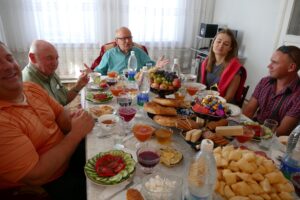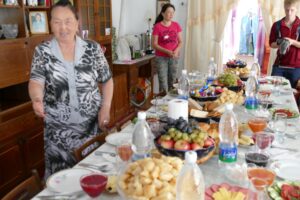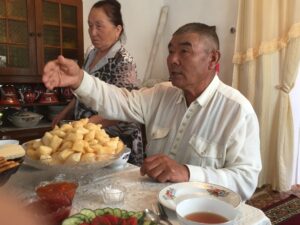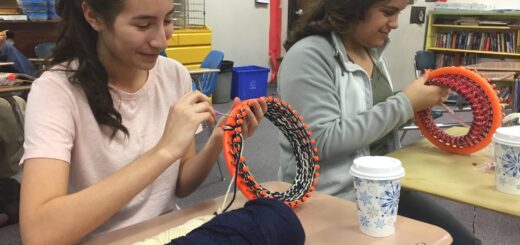Mission to Kyrgyzstan Part 2: Quincy teacher’s family welcomes us to the country in splendid style
Our North Central Washington delegation to Kyrgyzstan was treated to a special welcome from Turmbek and Akin Musaeva, the parents of Gulzat Perry, a native Kyrgyz who teachers elementary school in Quincy.
We were forewarned our fellow travelers who had been to Kyrgyzstan before that being invited for tea was much more involved. When we arrived, Akin Musaeva and her daughter Bakatgul and niece Caltant had put together an amazing spread of food, complete with mounds of Naan bread, fried bread, meats and cheeses, cucumbers and tomatoes and finished off with a traditional stew with mutton and home-made noodles. There was an enormous amount of food and we learned that Akin, her daughter and niece had spent long hours in the kitchen the past few days preparing for this event.
It was a wonderful way to enter the country and capture a taste for the hospitality that characterizes the culture here, which has been greatly influenced by being on the Silk Road network of routes crisscrossing from China to the Mediterranean. Our route to Cholpon-Ata on the banks of Lake Issyk-kul, a massive 108-mile long inland sea, was breathtaking. The terrain is reminiscent of North Central Washington with apple gardens, as they are called, appearing in the back yards of houses as we reached the city hosting the Nomad Games.
Our guide here Olga Kutischiva, a 24-year-old woman who has developed a special relationship with North Central Washington’s visitors to Kyrgyzstan. She holds a degree in international relations with an emphasis on conflict resolution and then won a fellowship to study nuclear disarmament in Switzerland. She worked for the Armenian Consulate in Bishkek and recently took a position with a European agency dedicated to fighting police corruption and strengthening the civil society. Corruption is a huge problem in this former Soviet state, which just celebrated its 25th anniversary of independence.
It is the only one of the “stans” that does not have oil, so it has been at a disadvantage economically. But it has tremendous conditions for growing food, including apples. Cashmere orchardist Randy Smith says the country produces great tasting apples but the size and coloring tends to be inconsistent.
The majority of the people in the country are Muslim, but it is clearly not a Muslim state. It’s a secular society with very liberal freedom of expression, we were told.

The family of Gulzat Perry gave us a warm welcome. From left to right, Scott Brown, Randy Smith, Tom Warren, guide Olga Kutischiva and our driver enjoy tea






